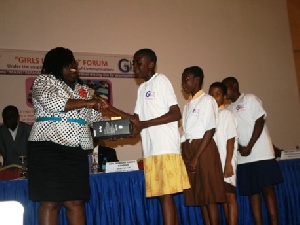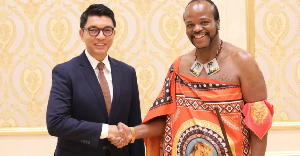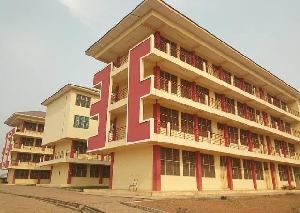Nana Oye Lithur, Minister of Gender, Children and Social Protection, on Thursday said government had accelerated the pace for equipping tertiary educational institutions with laptops as part of the E-education project.
She said government aimed at distributing over 400,000 laptops to both students and lecturers of tertiary institutions by the end of 2016 to inculcate Information and Communication Technology (ICT) in the country’s educational system.
Nana Oye Lithur said under the Better Ghana Agenda, ICT serve as a critical tool to aid both students and lecturers with the needed skills to build a modern economy.
She said other components of the E-education projects includes training teachers in ICT as well as establishing ICT laboratories for clusters of schools.
Nana Oye Lithur said this at the “Girls in ICT Day” forum in Accra which was on the theme; “Mainstreaming Girls In ICT – The Critical Missing Link in Development”.
The minister said ICT represented an important contribution to the mainstreaming of gender considerations in Ghana and that such an initiative was a great step.
She said the initiative was an indication of Ghana’s preparedness to empower women and girls in all sectors of the society especially those traditionally classified as the preserve of men.
She said if ICT was considered to be a tool for development: “for women to be advanced in the global market place and serve as better managers of developmental affairs, then they needed to be technologically equipped to deliver excellent results”.
Nana Oye Lithur said the “Girls in ICT” initiative was a remarkable step which should motivate young women and girls to develop interest in technology-based professions and use the opportunity to sharpen their skills.
She said equipping girls with ICT skills would promote gender equality in the field of technology and also promote personal development and self-sufficiency among young women and girls.
She expressed concern about the gender divide in access to ICT as a 2010 study, funded by the International Development Research Centre (IDRC), found that men were twice as likely to have access to internet as compared to women, and almost three times as likely to have an email address in Ghana.
She said in the employment sector where ICT was concerned in Ghana and across Africa, the field continues to be dominated by men due to cultural expectations about suitable occupations when ICT jobs were consistently ranked among top 20 careers with the best pay and best long-term prospects.
Nana Oye Lithur appealed to parents to monitor the activities of their children on the internet; despite the fact that it had great advantages and opportunities, it could also lead to negative socialisation of the youth, especially girls, who are prone to gender based violence.
Dr Edward Omane Boamah, Minister of Communications, said engaging more women in the ICT sector was vital because human talent with the right skill sets would continue to be the key for the building of a vibrant and diversified ICT sector.
He said the ICT sector needed to invest more resources in human capital development and in creating an enabling environment for women and girls.
Dr Omane Boamah said there were compelling economic reasons for engaging women more prominently to closing the male-female employment gap which was good for economic growth.
He said the World Economic Forum reveals that those countries that were role models in dividing resources equitably between women and men, regardless of their level of resources, fared better than those that did not.
He was hopeful that the “Girls in ICT” would expose girls and young ladies to yield the expected dividend.
Madam Eva Lokko, Chairperson for Girls in ICT, said the committee for the forum was established to ensure that every girl child had access to ICT across the country.
Madam Lokko said the initiative was also to empower girls to gain confidence in ICT and ensure that funds and scholarships were awarded to girls who would want to venture into ICT.
Laptops, modems and mobile phones were presented to the winners of the 150 schools who took part in the ICT marathon weekend club workshop.
Regional News of Friday, 26 April 2013
Source: GNA













